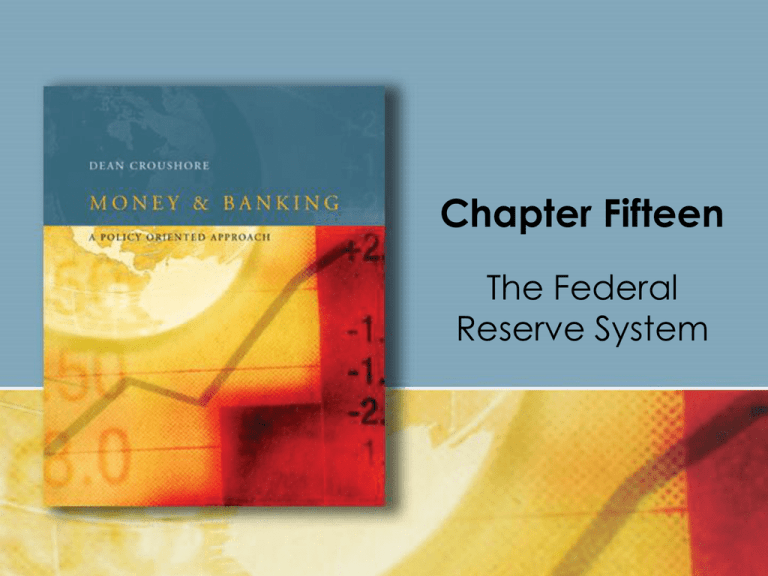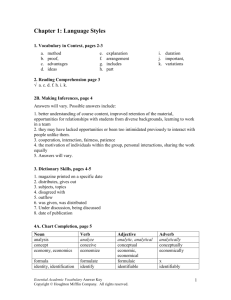
Chapter Fifteen
The Federal
Reserve System
The Federal Reserve System
• What is the Federal Reserve?
– The “Fed” is the central bank of the United
States…It oversees many financial institutions
and ensures the continued efficient
functioning of the payments system
– Comprised of three main parts
• The Federal Reserve banks
• The Board of Governors
• The Federal Open Market Committee (FOMC)
Copyright © Houghton Mifflin Company. All rights reserved.
15 | 2
The Federal Reserve System (cont’d)
• System is headed by
the Board of
Governors
• The twelve Federal
Reserve banks are
located throughout
the nation
Figure 15.1 The Structure of the
Federal Reserve System
• U.S. monetary policy
is determined by the
FOMC
Copyright © Houghton Mifflin Company. All rights reserved.
15 | 3
Federal Reserve Banks
Banks provide many services
• Check clearing services
• Supervision and examination of member
banks
• Track banking statistics and monetary
aggregates
• Supply currency and coin to member banks
• Serve as fiscal agent of the U.S. Treasury
• Act as a lender of last resort
Copyright © Houghton Mifflin Company. All rights reserved.
15 | 4
The Federal Reserve System
The locations of the 12 banks are a reflection of the political power
structure of 1913 and are spread out to diffuse power
Copyright © Houghton Mifflin Company. All rights reserved.
15 | 5
Structure of a Federal Reserve Bank
• Each is a corporation with a board of directors
and securities owned by its member banks
• Board of Directors selection is a reflection of the
public-private organization of the Fed-partly
localized and partly federally directed
• Main role of directors is to set strategy, approve
major spending, and set the discount rate
• Funding for operations comes from fees charged
for services and interest income from the holding
of financial securities
Copyright © Houghton Mifflin Company. All rights reserved.
15 | 6
The Federal Reserve System
Figure 15.3 Board of Directors of a Federal Reserve Bank
Copyright © Houghton Mifflin Company. All rights reserved.
15 | 7
Central Bank Functions
• Economic Research
– Keep bank president informed about the regional
economy, national economy, financial markets,
foreign economies, forecasts, and new research on
economics
– Produce Beigebook report on local economic
conditions for FOMC
– Economic education, articles in “Economic Review”
• Supervision & Regulation
– examine banks
– provide discount loans
Copyright © Houghton Mifflin Company. All rights reserved.
15 | 8
Central Bank Functions (cont’d)
• Statistics Department
– Compile banking statistics for money supply data
• Community & Consumer Affairs
– Help implement laws such as CRA and Truth in
Lending
Copyright © Houghton Mifflin Company. All rights reserved.
15 | 9
The Board of Governors
• The Board is more like a government agency
than the banks, and subject to more scrutiny
• Each member is appointed by the President to a
14 year term which is not renewable
– 7 governors serve
– One member’s term expires every 2 years
– Can stay more than 14 years if appointed to lessthan-full term initially
• Chairman of the Board of Governors is second
most-powerful position in U.S. after President
Copyright © Houghton Mifflin Company. All rights reserved.
15 | 10
Name
Members of the Federal Reserve
Board of Governors
Term Began Term Ends
Alan Greenspan
1987
2006
Roger Ferguson
1997
2014
vacant
2004
2018
vacant
1994
2008
Mark Olson
2001
2010
Susan Bies
2001
2012
Don Kohn
2002
2016
Copyright © Houghton Mifflin Company. All rights reserved.
15 | 11
The Board of Governors (cont’d)
• Chairman & Vice-Chairman are appointed
by the President to renewable 4-year
terms
• Chairman wields tremendous power
– Measure Chairman’s success by the inflation
rate, the only economic variable the Fed can
control in the long run
– Effects of monetary policy are short-lived
Copyright © Houghton Mifflin Company. All rights reserved.
15 | 12
Inflation Rate Under Fed Chairmen
CPI ex. Food & energy, 1/1958 to 9/2005
Chair
Avg Start End Change Term
Martin
2.6 2.8
6.2 +3.4
4/1951 to
1/1970
Burns
6.0 6.2
6.4 +0.2
2/1970 to
1/1978
Miller
9.1 6.2
10.0 +3.8
3/1978 to
8/1979
Volcker
6.3 10.0 3.9 -6.1
8/1979 to
8/1987
Greenspan 3.0 3.9
2.0 -1.9
8/1987 to
present
Copyright © Houghton Mifflin Company. All rights reserved.
15 | 13
Inflation Rates During Fed Chairmanships
Figure 15.4
Movement of the CPI (excluding food and energy prices) through
five Chairmen’s terms
Copyright © Houghton Mifflin Company. All rights reserved.
15 | 14
The Board of Governors (cont’d)
• Governors’ (other than Chairman) also
play an important role in the system
– Serve on FOMC
– Oversee operations of Federal Reserve
System
– Regulate banks
– Supervise Reserve Banks
– Public speaking
– Possibility always exists to outvote Chairman
Copyright © Houghton Mifflin Company. All rights reserved.
15 | 15
The FOMC
• FOMC influences the money supply
through open-market operations
• 12 voting members on the Committee
– 7 governors
– President of New York FRB
– 4 other presidents on rotating basis
• 7 non-voting members are the other FRB
presidents (rotating)
– Right to vote may not be as significant as
suggested by the press
Copyright © Houghton Mifflin Company. All rights reserved.
15 | 16
Open-Market Operations
• Open-market operations is the buying and selling of
government securities in the secondary market; a tool to
adjust the money supply
• Fed buys securities more reserves M ↑ fed
funds rate ↓
• Fed sells securities less reserves M ↓ fed funds
rate ↑
• Carried out at Open Market Desk of Federal Reserve
Bank of New York
• Buy or sell from primary government securities dealers
Copyright © Houghton Mifflin Company. All rights reserved.
15 | 17
FOMC Directive
• FOMC operates by giving a directive to the Desk one
statement of FOMC goals, and one operative sentence
• FOMC votes on the directive to (possibly) change the
target for the federal funds rate (ffr)
• Three main options to choose from
– Option A: cut ffr target 50 basis points
– Option B: keep ffr target unchanged
– Option C: raise ffr target 50 basis points
• 1 basis point = 1/100 percentage point
• When economy is very weak, Option C is not
considered. Option A not considered when economy is
very strong
Copyright © Houghton Mifflin Company. All rights reserved.
15 | 18
FOMC Meetings
• Typical meeting
– Report by International Desk on foreign-exchange
intervention
– Report by Open Market Desk on open-market
operations
– Discussion of Greenbook forecasts by Director of
Research and Statistics Division
– Go-around on the economy (all 19 participants)
– Discussion of Bluebook policy options by Director of
Monetary Affairs Division
– Go-around on policy (all 19)
– Vote (12 voting members)
– Discuss statement, especially statement on risks
Copyright © Houghton Mifflin Company. All rights reserved.
15 | 19
FOMC Meeting
• Deliberations of the committee are secret, but a
statement is issued shortly after each meeting
ends
• FOMC wants to communicate its policy views so
investors know what the Fed thinks of the
economy and what its long-term plans are
• Brief minutes are released 2 days after next
meeting; transcripts are released after 5 years
Copyright © Houghton Mifflin Company. All rights reserved.
15 | 20
Fed Independence
Attributes contributing to independence
• Governors have 14-year terms (avoids
political pressure)
• Governors’ terms end every two years, so any
U.S. President needs a long time to appoint a
majority
• Fed’s income comes from seignorage…an
independent budget (expenses ~$2.5 billion,
income ~$24 billion)
Copyright © Houghton Mifflin Company. All rights reserved.
15 | 21
Fed Independence (cont’d)
• Power of the Fed makes it
susceptible to political
pressure
• Economy’s strength closely
related to odds of reelection of President
– “It’s the economy, stupid”
– George Bush Sr. blamed
Greenspan for losing reelection in 1992
Copyright © Houghton Mifflin Company. All rights reserved.
15 | 22
Fed Independence (cont’d)
• But Fed’s independence could be changed
– Fed is established by law, not by Constitution
– Many attempts over the years to put the Fed
under the influence of politicians
• Does independence lead the Fed to
become inefficiently large (empire
building)?
• Does the Fed do the wrong thing because
it isn’t accountable?
Copyright © Houghton Mifflin Company. All rights reserved.
15 | 23
Fed Independence (cont’d)
• Is there evidence that the Fed does the
right thing, even though lacking in
accountability?
– Fed officials could make much higher salaries
in the private sector
– Ethics rules prevent officials from trading for
private gain
– Transcripts: Fed officials concerned with
public interest (Al Broaddus example)
Copyright © Houghton Mifflin Company. All rights reserved.
15 | 24
Fed Independence (cont’d)
• Lack of accountability?
– It’s hard to hold the Fed accountable in the
short run; can’t blame it for shocks that move
the economy in short run, but does it ease &
tighten appropriately (esp. 1990-91 period)?
– Main goal is long run inflation rate, which can
help to hold the Fed accountable in long run
Copyright © Houghton Mifflin Company. All rights reserved.
15 | 25


